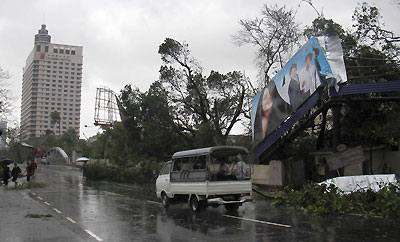Over 200 dead as cyclone devastates Myanmar
(Agencies)
Updated: 2008-05-04 20:18
Updated: 2008-05-04 20:18
 Central Yangon's Traders hotel is seen in the background as a vehicle with men drives past a damaged billboard in the former capital on May 4, 2008, a day after the former capital was hit by a cyclone. [Agencies]
|
YANGON -- More than 200 people have been killed in Myanmar by a Category 3 cyclone that ripped through Yangon and the Irrawaddy delta, where it flattened two towns, officials and state media said on Sunday.
Packing winds of 190 km (120 miles) per hour when it hit on Saturday morning, Cyclone Nargis devastated the former Burma's leafy main city, littering the streets with overturned cars, fallen trees and debris from battered buildings.
"Utter war zone," one Yangon-based diplomat said in an email to Reuters in Bangkok. "Trees across all streets. Utility poles down. Hospitals devastated. Clean water scarce."
A government official in Naypyidaw, the ruling general's new capital 240 miles (390 km) to the north, said the latest death toll was more than 200.
The BBC, citing a report on state television, said 243 people were dead and more than 20,000 homes were destroyed. State MRTV later said the death toll was 241, including 19 in Yangon and 222 killed in the hardest-hit Irrawaddy division southwest of the former capital.
Official newspapers in Yangon said only one in four buildings were left standing in Laputta and Kyaik Lat, two towns deep in the rice-producing delta and accessible mainly by boat. There were no details of casualties.
In Yangon, many roofs were ripped off even sturdy buildings, suggesting damage would be severe in the shanty towns that sit on the outskirts of the sprawling riverside city of 5 million.
Foreign aid workers, whose movements are restricted by the ruling military junta, had not managed to reach many impoverished areas to assess the impact.
"I have never seen anything like it," one retired government worker told Reuters. "It reminded me of when Hurricane Katrina hit the United States."
Although the sun was shining by Sunday morning, the former capital was without power and water, and food prices had doubled, with many storeholders unsure of when they would be able to replenish stocks. Most shops had sold out of candles.
An Electricity Board official said it was impossible to know when the power supply -- hit-and-miss at the best of times in one of Asia's poorest countries -- would be restored.
"We still have to clear the mess," the official, who did not want to be named, said.
|
||
|
||
|
|
|
|


